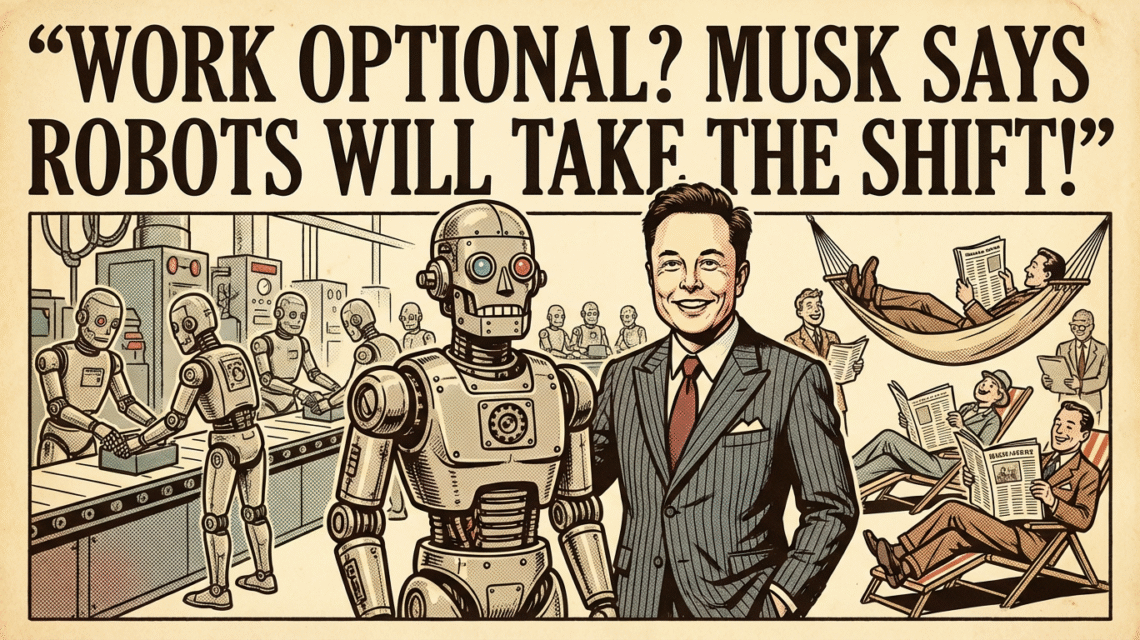Elon Musk Predicts Work Will Become “Optional” Within 20 Years—AI and Robots Are Coming for Your Job
Slug: elon-musk-work-optional-ai-robotics
Focus Keyword: Elon Musk future of work
Introduction: The End of the 9-to-5?
Imagine waking up on a Monday morning and realizing you don’t have to go to work—not because you quit, but because work is now optional. Elon Musk thinks this could be reality in 10 to 20 years. At the U.S.-Saudi Investment Forum, Musk predicted that advancements in artificial intelligence (AI) and robotics will make traditional employment a choice rather than a necessity. Sounds great, right? Unless you’re the guy who just finished paying off his MBA.
The Context: Musk’s Big Reveal
During his talk, Musk didn’t just throw out a random idea—he painted a picture of a future where work is more like a hobby. According to him, as AI and robotics evolve, they’ll handle most of the tasks humans currently do. That means your job might soon be as optional as growing your own vegetables. Sure, you could do it, but why bother when a robot can do it better, faster, and without complaining about Mondays?
Work as a Leisure Activity
Musk compared future work to playing sports or video games. Think about that: instead of grinding through spreadsheets, you might “work” for fun, like someone who grows tomatoes in their backyard even though grocery stores exist. Some people will still choose to work for personal fulfillment, but survival won’t depend on it. So, if you’ve ever dreamed of quitting your job to become a full-time gamer, congratulations—you might be ahead of the curve.
The Future of Money: Goodbye Paychecks?
Here’s where it gets even weirder. Musk speculated that money might become irrelevant in this AI-driven utopia. He referenced Iain M. Banks’ Culture series, where currency doesn’t exist because technology meets everyone’s needs. Imagine a world where you don’t need a paycheck to live. Sounds amazing—until you realize your collection of luxury sneakers might not impress anyone when robots make them for free.
The Transition: Not So Fast
Before you start planning your permanent vacation, Musk admitted this won’t happen overnight. There’s still “a lot of work to do” before we reach this future. Ironically, the path to eliminating work requires… more work. From developing advanced AI systems to restructuring economies, the transition will be complex and messy. So, don’t throw away your résumé just yet.
Implications for the Workforce
- What happens to jobs? Experts agree AI will transform employment, but they caution against panic. Historically, technology creates new roles even as old ones disappear. Maybe you’ll become a “Robot Therapist” or “AI Life Coach.”
- What about inequality? If robots do all the work, who controls the resources? Will we see universal basic income or something even more radical?
- What about purpose? Humans need meaning. If survival doesn’t require work, how do we define success? Spoiler: It won’t be growing vegetables.
Expert Opinions: A Reality Check
While Musk’s vision sounds like sci-fi, many economists and technologists agree that automation will reshape the labor market. According to a recent McKinsey report, up to 30% of current jobs could be automated by 2030. However, new industries—like AI ethics, robotics maintenance, and virtual reality entertainment—will emerge. So, yes, your job might vanish, but you could end up moderating robot therapy sessions. Progress!
Societal Impact: A Post-Work World
- Education: Do we still train people for careers, or for creativity and leisure?
- Economy: If money disappears, what replaces it? Resource allocation? Reputation points? (Please, not TikTok followers.)
- Mental Health: Work gives people structure. Without it, will we see a rise in existential crises—or just better golf scores?
The Role of AI and Robotics
- Manufacturing: Robots assemble cars faster than humans.
- Healthcare: AI diagnoses diseases with incredible accuracy.
- Finance: Algorithms trade stocks in milliseconds.
Potential Challenges
- Job Displacement: Millions could lose jobs before new ones appear.
- Economic Inequality: Wealth concentration might worsen if tech ownership isn’t democratized.
- Ethical Concerns: Who decides what robots do? And what happens when they do it better than us?
Conclusion: Ready or Not, Change Is Coming
Elon Musk’s vision of a post-work world is bold, controversial, and maybe inevitable. Whether you love your job or hate it, the next two decades will redefine what “work” means. Will you still need a résumé? Probably not. Will you need a hobby? Definitely.
Key Takeaways
- Musk predicts work will be optional in 10–20 years.
- AI and robotics will handle most tasks.
- Money might become irrelevant.
- Transition will be complex and require major societal changes.
- New jobs will emerge, but purpose and meaning will need redefinition.
SEO Keywords: Elon Musk, AI and robotics, future of work, optional employment, automation, post-work economy, universal basic income.



 AI Job Market Shake-Up in Washington D.C.
AI Job Market Shake-Up in Washington D.C.